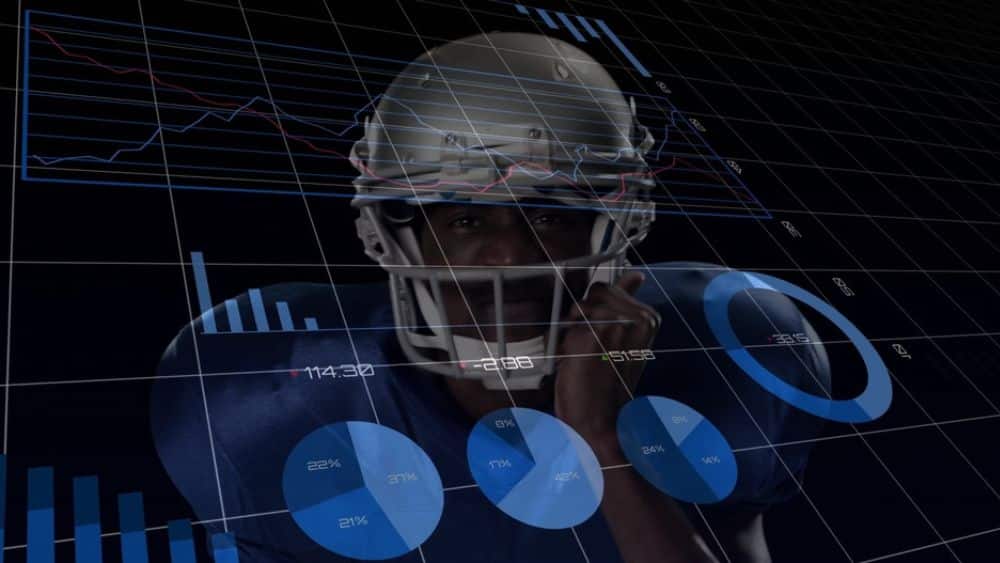
The NFL has always been a numbers game—yards gained, passes completed, points scored. However, today, those stats fuel far more than the scoreboard. Teams and league executives now rely on sophisticated analytics to evaluate players, shape game strategy, and even improve fan engagement. As a result, NFL data analytics jobs are in high demand, creating exciting opportunities for students, career changers, and sports enthusiasts who want to turn their passion for football into a rewarding career.
Whether you’re a recent graduate, a data professional, or simply someone who loves digging into stats, understanding the landscape of NFL analytics roles can be your first step toward a dream job in pro football.
What Are NFL Data Analytics Jobs?
Data analytics jobs in the NFL involve using data to drive smarter decisions across every level of the league. From statistical modeling to performance tracking and revenue optimization, analysts convert raw information into actionable insights that give teams and executives a competitive edge.
These roles are found across NFL teams, including data analytics jobs, as well as at the league office. Analysts might track player movement using Next Gen Stats technology, identify undervalued players for recruitment, or forecast ticket sales to maximize revenue. Whether the title is data scientist, football analyst, or business intelligence specialist, the goal is the same—to transform data into wins on and off the field.
Common responsibilities in NFL data analytics jobs include:
- Collecting and cleaning large sets of performance or business data
- Building predictive models for player evaluation and injury prevention
- Analyzing fan behavior to improve engagement and marketing campaigns
- Reporting insights to coaches, scouts, or executives for decision-making
Types of Data Analytics Jobs in the NFL
Data drives nearly every decision in the modern NFL, from player performance to fan engagement. Data analytics jobs in the NFL provide the opportunity to directly impact how teams strategize, scout talent, manage finances, and engage with fans. Across the league, franchises are building specialized analytics departments, allowing analysts to shape the game. Here are some of the most exciting roles:

- Football Performance Analyst: Transform raw tracking and game data into actionable insights for coaches. Build predictive models, uncover trends, and influence game-day decisions that can change the outcome on the field.
- Scouting & Recruitment Analyst: Spot the next breakout star by blending analytics with traditional scouting. Compare prospects, evaluate free agents, and assist front offices in identifying hidden talent before the competition does.
- Salary Cap & Contract Analyst: Optimize team rosters and finances to maximize efficiency and profitability. Model contract scenarios, manage salary cap constraints, and ensure teams get maximum value from every player.
- Marketing & Fan Engagement Analyst: Turn data into fan excitement. Analyze ticketing, merchandise, and social media trends to develop campaigns that enhance engagement and drive revenue.
- Business Operations Analyst: Streamline franchise operations and drive growth. From stadium logistics to sponsorship performance, use analytics to make every part of the business run smarter.
Every NFL team, from the Green Bay Packers to the Miami Dolphins, now employs specialists in these categories. For examples of NFL teams with data analytics jobs, see franchises like the Baltimore Ravens and Philadelphia Eagles, which have dedicated analytics departments shaping both player strategy and fan experience.
Education, Skills & Experience Needed
Breaking into data analytics jobs in the NFL requires more than just a passion for the game. You’ll need a strong foundation of education, technical savvy, and a fundamental understanding of football. These are the ingredients that can help your resume catch recruiters’ eyes.
Recommended Degrees
To build credibility and the right knowledge base, consider degrees in fields like:
- Statistics: helps with probability, hypothesis testing, and inferential modeling.
- Data Science: covers machine learning, data wrangling, and predictive analytics.
- Business Analytics: links data tools to business impact, making them useful for roles such as revenue or marketing analytics.
- Sports Management: gives context about how leagues, teams, and operations work in sports.
- Computer Science or Engineering: especially helpful for roles involving advanced modeling, infrastructure, or software that processes performance tracking data.
Essential Skills
Possessing these technical and domain skills can set you apart:
- Programming: SQL for databases, Python or R for data manipulation and modeling.
- Data visualization tools: Tools like Tableau, Power BI, or advanced Excel for dashboards and reporting.
Advanced Excel: Financial modeling, pivot tables, macros — still very relevant for many NFL business or operations analytics roles. - Football knowledge: You should understand the rules, play strategies, and player roles. This helps you translate data into insights that coaches, scouts, or front-office staff can use.
Many people also strengthen their credentials with certifications in analytics (e.g., Coursera, edX, DataCamp), sports management, or machine learning.
Salary Insights
Here’s what recent data shows about how much people in NFL data analytics–adjacent roles earn:
- A Data Analyst role at the NFL reports a total annual pay range of approximately $76,000 to $116,000, including bonuses and additional compensation.
- For NFL Analysts more broadly, average salaries are around $107,700/year, with most falling between $82,800 and $142,000, depending on experience and role specificity.
- A Data Analytics Manager can often expect to earn between $130,000 and $174,000/year in NFL roles, sometimes more, depending on the team, location, or level of oversight responsibility.
- ZipRecruiter reports that “NFL Analytics” positions (which often overlap with data analytics roles) average about $125,300/year, with significant variation—some earn much more based on experience, location, and specialization.
- An average NFL Data Analyst (in more specialized or senior positions) might earn approximately $82,600 annually, with typical ranges from around $62,500 to $97,000, depending on the role, seniority, and location.
That means when compiling your academic, technical, and football credentials, you’re positioning yourself for financially competitive roles—especially if you stack experience, specialize, and take on increasing responsibility.
How to Get Started in NFL Data Analytics
Landing a role in NFL data analytics requires persistence and a strategic approach. Here’s how to begin:

1. Build a Strong Academic Foundation: Take courses in statistics, programming, and sports analytics. Many universities now offer specialized programs in sports analytics or certificates in this field.
2. Create Real-World Projects: Work on football-related case studies, track player stats, or analyze play-by-play data to showcase your skills.
3. Gain Relevant Experience: Start with college athletics, minor league teams, or related industries like sports betting or ticketing analytics. These roles help build your portfolio.
4. Apply for NFL Internships: Internships provide valuable on-the-job training and networking opportunities. Explore current opportunities in NFL internships to get your foot in the door.
For more advice on starting at the ground level, check out this guide to entry-level NFL jobs, which explains the pathways many analysts use to launch their careers.
Tips for Landing NFL Data Analytics Jobs
Breaking into the NFL analytics world can be competitive, but the right strategy can put you ahead of the pack. Here’s how to stand out and land your dream role:
- Build a Strong Portfolio: Showcase your skills with real projects. Create predictive models, dashboards, or visualizations that turn data into actionable insights. Hosting work on GitHub or a personal website demonstrates initiative and technical ability.
- Gain Hands-On Experience: Internships provide invaluable exposure. Apply for NFL internships to work with league data, learn analytics tools, and build connections with professionals who can mentor you.
- Network Strategically: Attend sports analytics conferences, career fairs, and engage with professionals through JobsInSports.com’s The Network. Relationships often open doors that applications alone cannot.
- Tailor Your Applications: Make your resume and cover letter relevant to football analytics. Highlight projects, coursework, or prior experience that directly ties to NFL performance, marketing, or business operations.
- Stay Current and Learn from the Pros: Keep up with the latest analytics trends, technologies, and team strategies. Explore sports management jobs in the NFL and check out top NFL careers to see how analytics is shaping decisions both on and off the field.
With a strong portfolio, targeted networking, and a deep understanding of the game, you can position yourself to succeed in NFL data analytics jobs and turn your passion for football into a high-impact career.
Where to Find NFL Data Analytics Jobs
Finding the right opportunity is the first step to launching your NFL analytics career. With teams increasingly relying on data to drive decisions, the demand for skilled analysts is growing across the league.
- JobsInSports.com: Start your search with NFL jobs on JobsInSports.com, which lists openings at NFL teams and the league office nationwide. The platform offers a comprehensive view of roles in performance analysis, business operations, marketing, and more, making it the go-to resource for aspiring NFL analysts.
- NFL Teams: Every franchise now employs analytics specialists. Teams like the Baltimore Ravens, Philadelphia Eagles, and San Francisco 49ers have dedicated analytics departments influencing everything from player strategy to fan engagement. Researching individual teams helps you target your applications to the roles and locations that fit your career goals.
- League Office Roles: Beyond team-specific positions, the NFL league office hires analysts to support broader operations, from player data management to marketing analytics. These roles can provide exposure to league-wide strategy and a chance to impact the sport at the highest level.
- Location Considerations: NFL data analytics roles exist across multiple cities. Reviewing a list of NFL cities can help you identify where teams are hiring and plan for relocation if necessary.
By combining targeted research with the nationwide listings on JobsInSports.com, you can access the most up-to-date opportunities and find the role that best matches your skills and career goals in NFL data analytics.
Start Your NFL Data Analytics Career Today
The rise of data-driven decision-making has opened the door for tech-savvy football fans to turn their passion into a profession. Whether you’re interested in player performance, business operations, or fan engagement, NFL data analytics jobs offer a path to contribute to the game you love while building a rewarding career.
Ready to break into NFL data analytics? Join JobsInSports.com and The Network today to access insider resources, connect with industry professionals, and discover exclusive job listings that can launch your career in NFL analytics.





